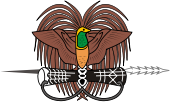- National Parliament of Papua New Guinea
-
Papua New Guinea 
This article is part of the series:
Politics and government of
Papua New Guinea- Queen
- Elizabeth II
- Governor-General
- Prime Minister
- Cabinet
- National Parliament (members)
- Speaker
- Political parties
- Elections: 2002, 2007
- Supreme Court
- Provinces
- Districts and LLGs
- Foreign relations
The National Parliament of Papua New Guinea is the unicameral national legislature in Papua New Guinea. It was first created in 1964 as the House of Assembly of Papua and New Guinea, but gained its current name with the granting of independence in 1975.
The 109 members of the parliament all serve five-year terms. 89 members are elected from single-member "Open" electorates, which are sometimes referred to as "seats" but are officially known as constituencies. The remaining 20 are elected from single-member "Provincial" electorates, each covering a province-level division: the 18 provinces, the autonomous province of Bougainville (North Solomons), and the National Capital District. Each Provincial member becomes the Governor of the province, unless they take up a ministry, in which case the position of Governor passes to one of the Open members from the province.
From 1964 until 1977 an Optional Preferential Voting System was used. The first past the post system was used from 1977 until 2002. Electoral reforms introduced by former Prime Minister Mekere Morauta introduced Limited Preferential Voting, where voters number their first three preferred candidates. LPV was first used nationally in the 2007 election.
As in other Commonwealth Realms, the party or coalition with the most seats in the parliament is invited by the Governor-General to form a government, and their leader subsequently becomes Prime Minister of Papua New Guinea, with the Prime Minister then appointing his cabinet from fellow members of the parliament.
Papua New Guinea has a fractious political culture and no party in the history of the parliament has yet won majority government. This has meant that negotiations between several parties have been necessary for governments to be formed. New governments are protected by law from votes of no confidence for the first 18 months of their term and in the last 12 months before a national election. More recently, in a move aimed at further minimizing no-confidence motions, then-Prime Minister Mekere Morauta introduced changes that prevented members of the government of the day from voting in favour of such a motion.
There is universal franchise for all citizens over the age of 18, although voting is not compulsory.
Latest election
Summary of the 30 June–14 July 2007 National Parliament of Papua New Guinea election results Party Seats +/– Elected After party changes National Alliance Party 27 30 +11 Papua New Guinea Party 8 +8 People's Action Party 6 +1 Pangu Party 5 –1 People's Democratic Movement 5 –7 United Resources Party 5 +4 People's Progress Party 4 5 –3 New Generation Party 4 +4 People's National Congress Party 4 5 +3 People's Party 3 +3 Rural Development Party 4 +4 Melanesian Liberal Party 2 +2 People's Labour Party 2 –2 PNG Country Party 2 +1 United Party 2 –1 Melanesian Alliance Party 1 –2 National Advance Party 1 +1 Pipol First Party 1 –1 PNG Labour Party 1 ±0 PNG National Party 1 –2 PNG Conservative Party 1 0 ±0 Independents 20 16 –1 Total (turnout %) 109 See also
- List of Speakers of the National Parliament of Papua New Guinea
- Members of the National Parliament of Papua New Guinea, 2002–2007
Parliaments of Oceania Sovereign states Dependencies and
other territories- American Samoa
- Christmas Island
- Cocos (Keeling) Islands
- Cook Islands
- Easter Island
- French Polynesia
- Guam
- Hawaii
- New Caledonia
- Niue
- Norfolk Island
- Northern Mariana Islands
- Pitcairn Islands
- Tokelau
- Wallis and Futuna
Categories:- Politics of Papua New Guinea
- Parliaments by country
- Westminster system
- National Parliament of Papua New Guinea
- Unicameral legislatures
- Queen
Wikimedia Foundation. 2010.
